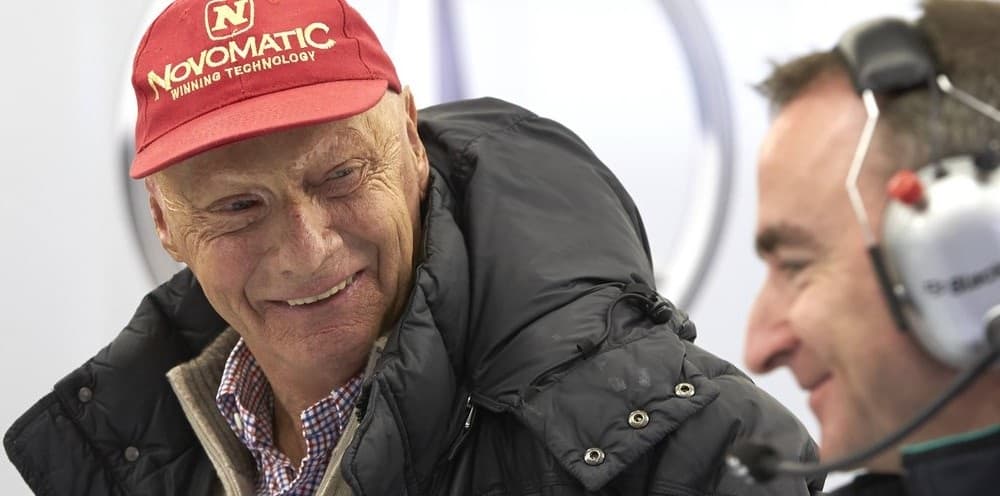Tires squeal, a race car out of control, flames, inferno, a drama and finally a miracle!
Niki Lauda survived. It was August 1st, 1976. Formula 1 racing took place at the infamous Nurburgring. It would be the last time that the premier league of motorsports took place at the legendary Nordschleife, also known as the Green Hell.
Niki Lauda was 27 years old at that time and defending world champion. He was also the antagonist to his challenger James Hunt, the sunny and playboy of Formula 1 of its time.
Lauda was obsessed with racing technology. He was a perfectionist and very disciplined. Lauda had been driving for Ferrari since 1974. Already in the second year with the Scuderia he won the title, the second should just become a sequel of his and Ferrari’s success as the beginning of a new racing era.
With the race number 10 Lauda would start the race as championship leader in the “green hell”, a typical German rural area near the Belgium border. He already had scored five victories that season and Nurburgring should just be another stepping stone to his next championship title.
Losing Control
After a left turn Lauda accelerated, he lost control of his Ferrari 312T2.
The car turned, with more than 200 kilometers per hour Lauda crashed into the green embankment. The Ferrari started to burn immediately, with high flames everywhere. The following driver Brett Lunger crashed into the fireball.
Then came Lauda’s rescuer – Arturo Merzario. The Italian immediately stopped his car and ran to Lauda’s burning wreckage. He heard Lauda screaming. With the help of track guards, Merzario was able to free him from the car.
“When I arrived, he was already unconscious, hanging lifeless in the straps. They were totally twisted by his desperate fight against death,” Merzario once told the” Bild am Sonntag” a leading German newspaper.
Becoming a Living Legend
Lauda couldn’t remember anything of the accident. In a special clinic in Ludwigshafen doctors fought for his life. For several days fluids are sucked of his lungs. Terrible pain, terrible agony. Lauda was fighting for his life. He would even get his last rites from a local priest.
“So I thought to myself: Not with me,” Lauda later recalled: “That was a good thing and motivated me to stay alive.”
These were the days that would make Niki Lauda a living legend. One to which everyone in Formula 1 would look up to ever since.
Like the fact that Lauda returned to racing just seven weeks after his accident at the Nürburgring. In Italy, on September 12, 1976, he would give his incredible comeback in a Ferrari at Ferrari’s home race.
“The quick return was part of my strategy of not sitting at home too long, always pondering why and why the whole thing happened to me,” Lauda once said.
He finished fourth in the Autodromo Nazionale di Monza.
Lauda would lose the championship that year by one point because he would give up the last race after terrible rain conditions at the Japanese Fuji race.
“This race is crazy,” he said back then. “There are more important things than a championship title. For example, my head, my life.”
Barbecue Party at Nurburgring
Later Lauda could even laugh about his accident. He once called his accident jokingly “Grillfest am Ring”. (Barbecue Party at the Nurburgring)
Even better, another story about an interview with an American TV journalist who was there to promote the Hollywood movie in Lauda’s honor – Rush.
“Well, that was one of those American Morningshows that came to the Nürburgring. They sent a woman, tall, blonde, everything. They wanted to interview me at the scene of the accident. They all said: Ui, he’s surely going to cry, it’s going to be a big emotional moment for him!”
But not with Niki Lauda, the man with an iron will. Lauda continued:
“But I took a ‘Kipferl’ (German pastry shaped like French croissant) from the hotel buffet and put it in the grass before the interview was supposed to start.
Then the questions: ‘Mister Lauda, how is it to be here …’ I say: ‘Just a moment!’ I took a few steps into the grass. The interviewer asked: ‘What are you doing?’ I say, ‘Oh look, here’s my ear!’ showing her my previously hidden Kipferl. She completely lost her composure. They had to redo everything again.”
Remembering Niki Lauda – Ralf Bach
You couldn’ take everything seriously with Niki Lauda.
If he was upset about something, you could hear him complaining of not paying “the proper respect” because his argumentation would be based on a bizarre comparison “after all, I’m something like a god-like appearance.”
Despite pretending to joke you could feel he meant it. As a matter of fact, he wasn’t that far off. In his native country of Austria, he was something of a god. They treated him like one since he almost burned at the Nürburgring in his Ferrari and Lazarus (Niki) was back in the red car six weeks later.
In recent years, he was tired of talking about that fateful event in August 1976, which made him immortal because he survived.
“because I find it tedious.” Of course, he would always talk about it. Immediately he would tell you the story of that funny guy who just before the crash wanted an autograph from Lauda.
“There was one who insisted I would mark the autograph with a date. I ask, ‘Why’ and he replied ‘It could be your last.'”
Hours later, Lauda would burn in his Ferrari.
In fact, he liked to talk about the time after the accident. About how a priest breathed new life in his crippled body that saved him from withering away when his body was full of burn and his lungs tainted from poisonous fumes.
“Although my eyes were bandaged, it’s one of the few moments that I can remember clearly. I was in intensive care, severely tormented by the pain, when the nurse asked me if I wanted the last rites. I thought for a moment and decided it couldn’t hurt, so I nodded and waited for what would happen. “
The priest thought he was talking to an unconscious man. But Lauda wasn’t, “I only knew how someone touched my shoulder, but nothing else happened, and I slowly realized that the priest had put the last rites on my shoulder without saying a word. I got angry, enraged about this thought … I expected someone to come to talk to me, comfort me, and then something like that. Silently, the priest would leave my room – that’s what made me outraged, of course. I felt this enormous anger and thought: Now all the more, I will not let it go, I will not give up.”
Lauda and Ferrari
Niki Lauda had his own views on Ferrari and its myth. After his accident at the Nürburgring, he quickly became suspicious. No sooner was he racing again after the miraculous healing in Monza, he was already presented with a potential replacement Carlos Reutemann.
Just as the priest in the hospital gave him the will to survive, Enzo Ferrari provided the special motivation to succeed in racing again:
“I swore two things then,” Lauda would later tell journalists, ”I will show this Reutemann, who is the faster of us both and I will leave Ferrari when I’m again world champion.”
Das war dann 1977. Lauda: “Als ich es Enzo mitteilte, schlachtete er mich in der italienischen Presse. Ich sei Judas, der sich für 30 Salami an die Konkurrenz verkauft hätte, ließ er verlauten.” Umso erstaunlicher aber typisch für Laudas Zickzack-Kurs im Leben:
In 1977: “When I told Enzo, he slaughtered me in the Italian press, saying I was a Judas, who sold himself to the competition for 30 salami,” Niki Lauda recalled.
Yet, Lauda couldn’ give up the Ferrari myth completely. Surprising, but typical of Lauda’s constant zigzag course in life. Luca di Montezemolo, Enzo Ferrari’s protege, would earn the title of Ferrari president in 1988 after Enzo’s death. The Italian aristocrat made Lauda an offer to work for Ferrari again as a consultant.
Lauda: “I agreed and made sure that Jean Todt would be hired as team principal and three years later as Michael Schumacher driver.”

